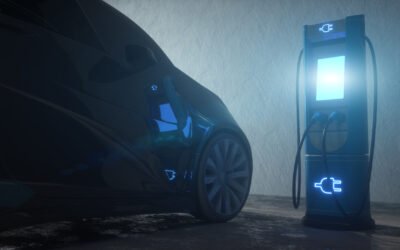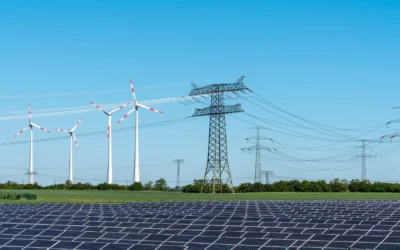The Electric Vehicle Innovation Summit (EVIS) held in Abu Dhabi, UAE was an extraordinary event that showcased the latest advancements, trends, and challenges in the electric vehicle (EV) industry. With over 50 exhibitors and thousands of attendees, the second occurrence of this exhibition and conference was a testament to the growing importance and interest in clean and sustainable transportation. The conference brought together industry leaders, experts, and influential figures from across the e-mobility value chain. From leading electric vehicle manufacturers (OEMs) to charging point operations (CPOs), E-Mobility Services Providers (MSPs), and various other stakeholders, the event fostered invaluable networking connections and encouraged collaboration across diverse value chains.
Throughout the summit, panel discussions, presentations, speeches, and thought leadership sessions took place, offering deep insights into the challenges and opportunities of the EV industry. One of the prominent themes was the need for a robust and easily accessible charging infrastructure. Experts emphasized the importance of developing a sturdy network of charging stations to expedite the widespread adoption of electric vehicles in the region. Collaboration between automakers, utilities, and charging station providers was highlighted as key to realizing a seamless EV charging experience.
Several presentations and panel discussions focused on the importance of EV charging infrastructure and the challenges and opportunities associated with its development. Topics included the cost and complexity of installing charging stations, standardization, interoperability, and the roles of government and private sector stakeholders. The charging infrastructure is deemed underprovided and difficult to access, hampering the growth of EVs. Additionally, the lack of established electricity tariffs and metering arrangements for EVs, as well as the absence of purchase incentives, posed hurdles to faster uptake in the market. Nevertheless, the potential for EVs in the Middle East is evident, with their cost competitiveness and availability of SUV models catering to the GCC market. Governments in the region have made renewable energy, clean transportation technologies, and energy diversification plans strategic priorities, further emphasizing the importance of EVs in achieving net-zero ambitions.
One of the presentations focused on Plug and Charge as a solution to expand the seamless EV charging experience across all car and charger manufacturers, regardless of brand and location. This innovative approach is based on an internationally agreed-upon communication standard (ISO 15118). The presentation explained the ecosystem of stakeholders involved in making the Plug and Charge experience seamless, similar to everyday payment methods. The audience learned about the benefits of offering Plug and Charge to customers and the necessary steps to unlock this essential feature in products and services.
The event also shed light on the growing interest in EVs, with significant investments coming from the UAE and Saudi Arabia. However, there is a need for increased involvement from utility companies and real estate developers to enable the transition to EVs. The panelists highlighted the importance of public-private partnerships and subsidies to build more EV chargers.
The exhibition featured a wide range of electric vehicles from established manufacturers, showcasing their latest models with sleek and futuristic designs, practicality, and efficiency. Companies presented their innovative solutions for charging infrastructure, including ultra-fast charging stations, smart grid integration, , autonomous charging robots, and wireless charging technologies. It also emphasized the importance of sustainable materials and manufacturing processes, as companies explored eco-friendly alternatives and minimized carbon footprints.
Several agenda points covered during the conference addressed key topics such as the EV market in the Middle East, the role of governments and businesses in accelerating the transition to zero-emission vehicles, strategies for building EV charging infrastructure, the integration of renewable energy, innovation ecosystems, fleet electrification, and the future of the EV market.
The event concluded with a sense of optimism for the future of clean and sustainable transportation. The level of innovation, collaboration, and diversity of electric vehicles showcased during the exhibition demonstrated that EVs are not merely a passing trend but a fundamental shift in the automotive industry. The event highlighted the immense potential for the growth of the EV market and the importance of addressing challenges through collaboration and strategic initiatives. Overall, the Electric Vehicle Innovation Summit left attendees with a deep appreciation for the advancements made in the EV industry and a renewed determination to drive the transformation toward a greener and more sustainable transportation future.
Contact Sales:
Europe
+49-89-12250950
Americas
+1 408-604-0522
Japan
+81-80-7808-1378
GCC/Rest of APAC
+971-58-1602441
More about our:
Services
Recent Insights
Nordics EVCI Market Comparison: Quarterly Growth and Market Dynamics – 2024
This infographic examines the ambitious policies and regional targets that are propelling the growth of Electric Vehicle Charging Infrastructure...
Europe’s Switch to Sustainable Power: The Rise of Solid-Insulated Switchgear
As Europe intensifies its shift towards sustainable energy solutions, Solid Insulated Switchgear (SIS) is emerging as a key technology in the...
Electrifying Future: Emerging Trends and Strategic Targets in the Middle East
This infographic presents an overview of the burgeoning electric vehicle (EV) market in the Middle East. It highlights the region's ambitious...


